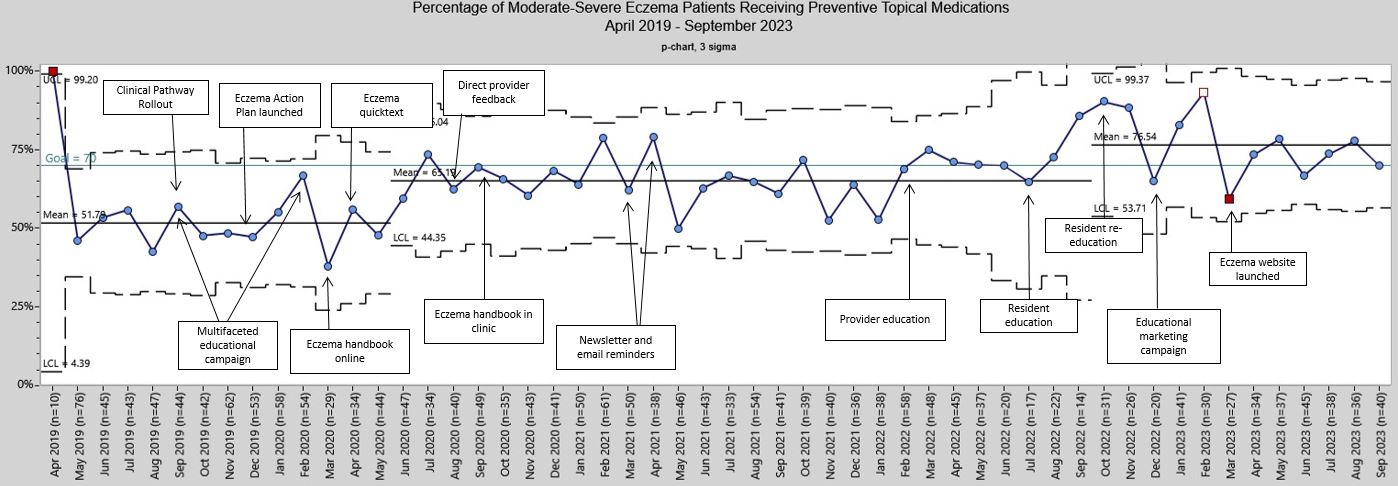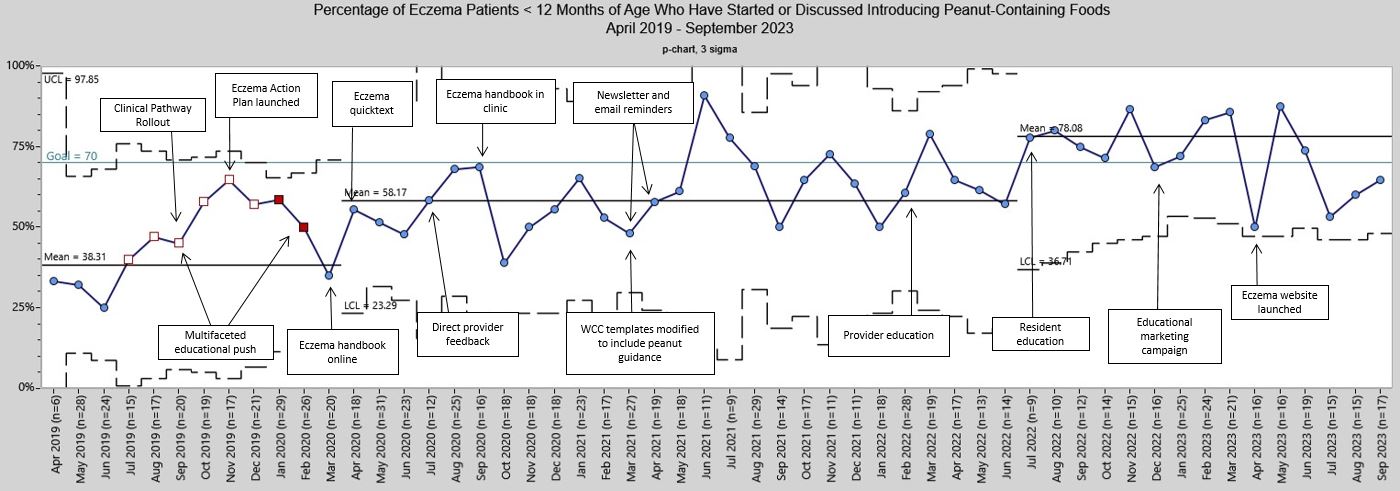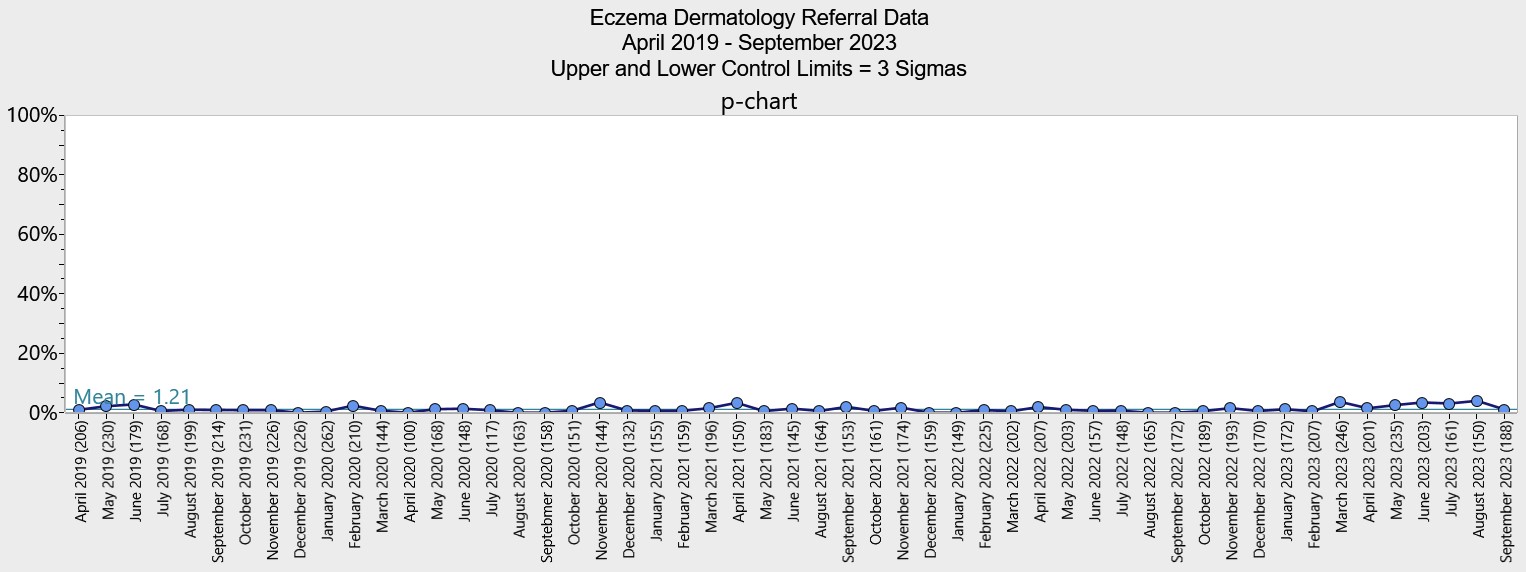Back
Background: Pediatric eczema is a common condition that can usually be managed in a primary care setting. However, primary care providers often fail to follow clinical practice guidelines recommending preventive use of topical medications and early peanut introduction for children with eczema.
Objective: To increase to 70% the proportion of patients with moderate-severe eczema presenting to primary care who are using topical medications preventively, as well as patients between 6 and 12 months who have started eating peanuts or discussed peanut introduction with their providers.
Design/Methods: At two hospital-affiliated primary care clinics, we implemented a multi-disciplinary process improvement effort to standardize management of eczema between September 2019 and September 2023. This included the development of a clinical pathway with information about eczema diagnosis and management. We performed multiple PDSA cycles to enhance provider compliance, including educational talks, clinic signage, autotext for visit notes as well as inclusion of peanut guidance in Well Child Care note templates, Eczema Action Plans and patient handbooks, a Sharepoint repository for handouts and information, and email feedback to providers who failed to meet the measures. Data were collected through a survey linked to provider billing, which also provided an ongoing reminder of the project to providers. We measured monthly rates of preventive medication use and early peanut introduction using statistical process control charts. New referrals to Dermatology for eczema were monitored as a balancing measure.
Results: Use of preventive topical medications increased from a baseline of 52% to 77% following implementation (Figure 1). Initiation or discussion of early peanut introduction increased from a baseline of 38% to 77% (Figure 2). Dermatology referrals for eczema remained low with a mean of 1% of eczema visits per month (Figure 3).
Conclusion(s): A multi-pronged improvement effort increased the practice of guideline-recommended care for patients with eczema in a primary care setting. Future efforts should evaluate the impact of interventions on patient quality of life and eczema severity.



Quality Improvement/Patient Safety
Session: Quality Improvement/Patient Safety 3
2 - A Quality Improvement Project to Increase Guideline-Adherent Care for Eczema in a Primary Care Setting
Monday, May 6, 2024
9:30 AM – 11:30 AM ET
Poster Number: 2
Publication Number: 2.3100
Publication Number: 2.3100

Corinna Rea, MD, MPH (she/her/hers)
Assistant Professor
Boston Children's Hospital
Boston, Massachusetts, United States
Presenting Author(s)
Background: Pediatric eczema is a common condition that can usually be managed in a primary care setting. However, primary care providers often fail to follow clinical practice guidelines recommending preventive use of topical medications and early peanut introduction for children with eczema.
Objective: To increase to 70% the proportion of patients with moderate-severe eczema presenting to primary care who are using topical medications preventively, as well as patients between 6 and 12 months who have started eating peanuts or discussed peanut introduction with their providers.
Design/Methods: At two hospital-affiliated primary care clinics, we implemented a multi-disciplinary process improvement effort to standardize management of eczema between September 2019 and September 2023. This included the development of a clinical pathway with information about eczema diagnosis and management. We performed multiple PDSA cycles to enhance provider compliance, including educational talks, clinic signage, autotext for visit notes as well as inclusion of peanut guidance in Well Child Care note templates, Eczema Action Plans and patient handbooks, a Sharepoint repository for handouts and information, and email feedback to providers who failed to meet the measures. Data were collected through a survey linked to provider billing, which also provided an ongoing reminder of the project to providers. We measured monthly rates of preventive medication use and early peanut introduction using statistical process control charts. New referrals to Dermatology for eczema were monitored as a balancing measure.
Results: Use of preventive topical medications increased from a baseline of 52% to 77% following implementation (Figure 1). Initiation or discussion of early peanut introduction increased from a baseline of 38% to 77% (Figure 2). Dermatology referrals for eczema remained low with a mean of 1% of eczema visits per month (Figure 3).
Conclusion(s): A multi-pronged improvement effort increased the practice of guideline-recommended care for patients with eczema in a primary care setting. Future efforts should evaluate the impact of interventions on patient quality of life and eczema severity.



